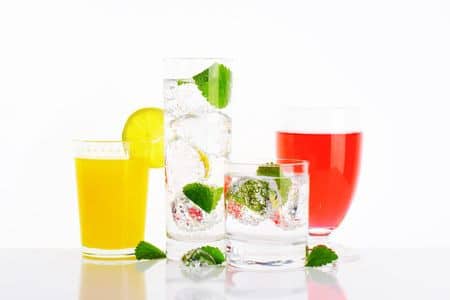
Health drinks are all the rage. However, some promise more than they can actually deliver. An overview of the highly acclaimed wellness drinks. The online guide to healthy eating MuscleFood.com has now taken a closer look at the 5 trendiest health drinks. So are wellness drinks really as healthy as they promise?
Coconut water
The low-calorie coconut water does take some getting used to when enjoyed pure. As a base for green smoothies, however, it makes a wonderfully refreshing change that is also a little reminiscent of a vacation. Coconut water is a good source of potassium and is therefore said to help the body absorb more water. Especially during sport, when you sweat a lot, this is a good way of replenishing the body’s fluid loss. According to the manufacturers, coconut water is also the ideal drink after training, as it contains a particularly high level of electrolytes.
However, there is no scientific evidence to date that coconut water actually increases the body’s water absorption. Apart from the fact that the crystal-clear water with a certain Caribbean note is a nice change from mineral water or flavored water – it doesn’t increase the fluid balance any more than conventional tap water. Nutritionists warn that some manufacturers of coconut water also add a lot of sugar to the drink. This ultimately completely removes its status as a “health/wellness drink”.
Matcha tea
A few years ago, matcha was virtually unknown in this country, but it has now become the ultimate brain booster. Whether in smoothies or pure as tea – the green powder can be found everywhere. In addition to vitamins and minerals, matcha contains many secondary plant substances and is therefore considered a free radical scavenger in the body. In fact, there are studies that indicate that matcha tea has a health-promoting effect. It states that it can reduce the risk of cancer and help with weight loss.
Other studies have shown that matcha promotes regeneration after sport and strengthens the immune system. Many convinced matcha tea consumers also swear by its balancing effect on the mind. With the latter, however, it depends primarily on how the tea is prepared as to whether it has a calming or invigorating effect.
Wheatgrass juice
Whether trendy is also healthy was also examined in the next candidate in the test: wheatgrass juice is said to contain a variety of health-promoting ingredients: It contains all the minerals, many vitamins, proteins, the green leaf pigment chlorophyll, which is good for blood formation, as well as many antioxidants.
Some swear that wheatgrass juice is the elixir of life par excellence. However, nutrition expert Alison Hornby of the British Dietetics Association points out that wheatgrass juice is no healthier than any other vegetable or fruit. It’s just more stylish – and more expensive.
Beet juice
Your taste buds will have to get used to this drink too, but it’s worth it: beet juice is the only beet drink in our range of wellness drinks that has actually been proven to have a health-promoting effect! Due to its high nitrate content, beet can have a blood pressure-lowering effect, and the red tuber also contains a lot of vitamin C and B as well as potassium.
Activated carbon
In the UK and the USA, activated charcoal is currently being highly praised. Among other things, you can enjoy it in your cappuccino, but also as black water. The charcoal is said not only to whiten the teeth, but above all to detoxify the body. However, these theories have not been proven.
The preparation of wellness drinks
Wellness drinks can be prepared in many different ways. There are no limits to the imagination. The most natural preparation is water-based, with fresh ingredients. Whether sweet or spicy, everything is possible according to taste. Sweet wellness drinks usually consist of fruit and sweeteners such as sugar, honey or syrup. Spicy wellness drinks, on the other hand, consist of vegetables such as tomatoes, cucumbers, peppers, avocado and spices such as chili, pepper or salt.
The fresh ingredients are either juiced or pureed. The advantage lies in the freshness and the completeness of all vitamins and ingredients. After blending or pureeing, the wellness drinks are usually topped up with ice cubes or water.
“Wellnepp”: consumers tricked
Whether the various herbal additives in the drinks have the advertised effect has not been proven. Experience has shown that lemon balm tea helps with sleep disorders. It is not known to what extent lemon balm extracts have a relaxing effect in combination with mineral water and other herbs.
The consumer centers complain that it is misleading and deceptive if statements about the effect of a product are not scientifically proven. The industry cleverly avoids this accusation. Advertising claims such as “lemon balm has a calming effect” often do not refer to the product, but only to the good reputation of the additives. The consumer advice centers are therefore calling for legal regulations to ensure that advertising claims explicitly refer to the product and not to individual ingredients.
The positive image of individual substances such as aloe vera, kombucha and shiitake is also being thoroughly polished up by the media. The clever advertising strategy almost borders on consumer deception. As long as medicinal substances or sugar are not overdosed, wellness drinks do not pose a health risk. But if you want to switch off and relax, you shouldn’t expect too much from the drinks. Until misleading advertising is banned, consumers should listen to their reason and critically scrutinize health promises.
Fruit-based wellness drinks
So are wellness drinks really that healthy? The Hamburg consumer advice center has taken a close look at industrial wellness drinks. It was found that half of the fashionable soft drinks examined contained no fruit juice at all, contrary to the outer packaging, while the rest contained a maximum of around five percent.
In most cases, the refreshment advertised as fruity and fresh was a mixture of drinking water and citric acid, enriched with plenty of additives and flavorings. Furthermore, it was also found that none of the products tested did not contain any flavorings. Unfortunately, even organic products were no exception.
The experts advise anyone who wants to do something good for their body to make their own wellness drinks – you know what you’ve got!
